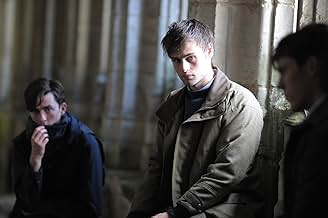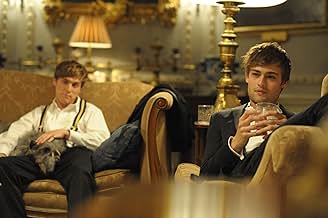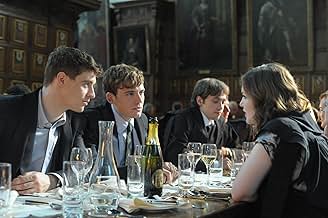Dois alunos do primeiro ano da Universidade de Oxford se juntam ao infame Riot Club, onde reputações podem ser feitas ou destruídas no decorrer de uma única noite.Dois alunos do primeiro ano da Universidade de Oxford se juntam ao infame Riot Club, onde reputações podem ser feitas ou destruídas no decorrer de uma única noite.Dois alunos do primeiro ano da Universidade de Oxford se juntam ao infame Riot Club, onde reputações podem ser feitas ou destruídas no decorrer de uma única noite.
- Prêmios
- 2 indicações no total
Avaliações em destaque
These are entitled rich brats. None of them are that compelling as individual characters. Most of them are too interchangeable. Their hi-jinx are annoying and not particularly imaginative. It's a lot of drinking and destruction. Throwing in Natalie Dormer as a hooker does help. There is boring boorish talk and a couple of interesting moments. The scene with Lauren in the restaurant is wrong. It's excusable that Miles is drunk but Lauren is too slow on the uptick. Even then, Miles can't be that weak-minded. It makes no sense that he doesn't leave to chase after Lauren other than for the sake of the story. There are a few clunky moments. It's unbelievable that the guys don't do more than a night in the drunk tank. They walk out with their clothes which should be taken as evidence. The only way to make it all work is if the cops are bought off right away. The possibility is there but it's not sharp enough.
Alistair (Sam Claflin) and Miles (Max Irons), both aristocratic and with either latent or pronounced class prejudices, begin their first term at Oxford University. Their social standing makes them attractive prospects for the infamous Riot Club. With a maximum membership of ten at any time, mystery surrounds the exclusive, secret society that has a closer bond than the Masons and a legendary penchant for excess, debauchery and a privileged standing that means the members never suffer the consequences of their hedonism. Banned from Oxford's finer establishments, the Club prepares for their annual dinner and the investiture of their news members.
I'm not sure The Riot Club has anything much to say. Is it a piece of social commentary? If so, we already know there are those who are moneyed, privileged and get away with murder, sometimes literally. If it is to excite us and make us hanker for the greener grass on the other side of the fence, it fails; why would we want that? If director Lone Scherfig (One Day, An Education) is aiming to show us how fortunate we are not to be part of that world, then surely there are subtler ways of doing so.
The Riot Club isn't a bad film; it is just a largely unpleasant one. This is a voyeuristic look through a grimy window at a display of wanton abandon and viciousness at the expense of absolutely everyone who isn't, or wasn't, part of The Riot Club. While most naughty boys think they can get away with scrumping apples, bunking off school and firing catapults at innocent, harmless animals, these are loathsome, obnoxious boys who grew up on a campaign of hatred and swapped their misdemeanours for felonies like vandalism, violence, and rape.
Nice club! Perhaps for those who have been through that educational experience and are part of that tiny segment of society of privileged society it means something. Certainly the man behind me laughed periodically in apparent understanding. He was the only one in our small audience. Me? I felt uncomfortable through most of it, particularly with the pseudo morality of Miles when he apparently tries to do the right thing and rise above it, though his peers do not hold back in reminding him he, too, is there by choice.
The Riot Club is well performed by all, the attention to detail feels meticulous, from the perspective of one on the outside, and, yes, there is a part of me that enjoyed it. It was a fascinating experience that repulsed me frequently and left me feeling rather dirty; a little like the evening I had rotten.com inflicted on me by a long-eschewed former colleague.
I suspect The Riot Club will have a limited audience and most of those who venture out will find something within it to fascinate them. I can't imagine many in my circle of friends wanting a repeat viewing or wishing for a life in the inner circle of society afterwards, though.
Well constructed, fascinating and repulsive, The Riot Club is a classic example of a film that is good, despite the subject matter being thoroughly unpleasant.
For more reviews from The Squiss, subscribe to my blog and like the Facebook page.
During the fresher's activities, Miles quickly befriends the middle- class Lauren (Holliday Grainger), a friendly girl from Northern England; the romantic pair have a sweet naturalism as they playfully talk about and erode their differing heritages. The scowling, aloof Alistair however proves to be not much of a conversationalist.
Both are soon inaugurated into the Riot Club, whose other members include Harry Villiers (Douglas Booth), the pretty boy who struck me as the de-facto leader of the club; Hugo Fraser-Tyrwhitt (Sam Reid), a closet homosexual with an attraction to Miles; Dimitri Mitropolous (Ben Schnetzer), a horribly rich Greek student, and James Leighton- Masters (Freddie Fox), the smug little squirt who's somehow the president of the club. Some have said that it is littered with caricatures, however the film isn't about ordinary Oxford students or ordinary privilege, it is about an elite circle of extreme wealth and aristocracy.
After Miles and Alistair make up the Riot Club's ten members, the group soon have their risibly pompous suits tailored and set off for a night's debauchery to The Old Bull, one of the few establishments they haven't been banned from. By the time this happens, I thought I had the measure of the pretentious characters and the film's narrative and tone, however as the 'dinner' progresses, both the characters and the course of events become veritably loathsome.
As most will know, The Riot Club is inspired by the Bullingdon Club, an Oxford University dining society infamous for its destructive hedonism that boasts alumni such as David Cameron, Boris Johnson and George Osborne. The film's main target of attack isn't the purported anti-social behaviour of such people, the obnoxious decadence we witness is not endemic to the highly disagreeable 'Riot Club', what it attacks is rather the characters' raging, blue-blooded superiority complexes that causes it. Some may disagree with its politics, they may consider it a gross exaggeration; it is indeed vehement in its depiction of class wars, however I think it is undeniably a very well executed piece of filmmaking.
The film is adapted from the stage play Posh by Laura Wade, and the middle section of the narrative, which is one long scene, certainly feels like the work of a playwright. Like Tracy Letts' Killer Joe (2011) and Bug (2006), it is another example of how punchy stage material often makes an excellent transfer to the cinema.
Much like Letts' work, The Riot Club contains a maelstrom within a cramped four walls; the scene goes from embarrassing to plain excruciating as the decuplet, fuelled by alcohol, drugs and each other's presence, become increasingly hateful and immoral, the vile crescendo eventually reaching a climax that's genuinely shocking. It is all witnessed by the unassuming pub landlord. He is initially honoured to host the boys, the sight of him sycophantically at the beck and call of people half his age who look at him the way they would dog mess on their shoe is pathetic in the true meaning of the word.
The worst offender is Alistair, Sam Claflin is excellent when delivering his well-written diatribes with drunken, acerbic hatred. Alistair's genocidal contempt for the working classes and those bereft of prestige bore similarities to Adolf Hitler's loathing of Jews; he gets so angry that he's reduced to saying 'I'm sick to f*cking death of poor people!' Alistair is the most odious example of unearned privilege and arrogant sense of entitlement, he rants about the successes and innovations of the ruling classes and the proletariat's supposed jealousy as if he's had a part in it, after all, what exactly has he achieved apart from winning the genetic lottery? Claflin proves himself as an accomplished villain actor, he gives his character a sociopathic quality; when there aren't flashes of his vulgar jealousy, resentment and massive hubris, Alistair has an unnerving emotional vacuity.
The Riot Club is not simply 107 minutes of pretty boys holding champagne flutes, it is a sharply made thriller that is perhaps politically divisive but rivetingly executed.
The Riot Club begins with the group looking to recruit two new starters, as Alistair (Sam Claflin) and Miles (Max Irons) emerge as possible candidates. However, over the course of a single evening, the club's reputation is put on the line.
The film itself is very much an emotional roller-coaster. Initially, there are plenty of laughs to be had, mostly executed through witty one-liners, though it becomes a lot darker with some shocking scenes that make for extremely uncomfortable viewing. It's the latter which highlights the film's superb acting, as the young cast give genuinely convincing performances. Holliday Grainger, who plays Lauren - Miles' love interest, particularly stands out here.
Playwright Laura Wade adapted the film from her own play "Posh", and it clearly shows, as a large portion of the film is based at the table in the restaurant. While it comes as a slight disappointment that The Riot Club doesn't stray too far from its theatrical origins, it does seem to work in the film's favour, adding to the suspense before the highly dramatic climax.
Wade unsubtly incorporates a number of themes in The Riot Club that are reflective of the society we live in, including the inherited privilege and power culture in the country. There's also a lot of political satire, which comes as no surprise considering some of The Bullingdon Club's ex-members include the current British Prime Minister David Cameron, Chancellor of the Exchequer George Osborne and Mayor of London Boris Johnson.
Overall, The Riot Club is an excellent play-adaptation that makes for a highly gripping film. There's laughs a plenty, shocks a plenty and a great cast. This is a must-see.
That said, the writer, Laura Wade, explores some very complex issues regarding wealth and peer pressure. While these themes have been depicted in movies over and over again, she does not imply that the entire upper class is a bunch of arrogant pricks, who think they can buy their way out of everything. Clearly, they can, you can't really fault them for that, but the Riot Club is not inherently an evil society. They are rich, they drink, and they sometimes lose control, as we all do. The difference is that there are no consequences for them, so they can keep on doing it. I liked how peer pressure was depicted in this film and how the guilt and responsibility of some of the members was shown. It really made me consider how we act in situations we have very little control over and how responsible should we feel in these kinds of situations.
My only complaint about the movie would be the main character (Miles Richards) being a flawless Mary Sue - rich, handsome, witty, intelligent, kind and well meaning, as well as some of the other positive characters being presented as these morally superior beings. That felt very strange for a movie, the main idea of which is that not everything is as black and white as it seems, and we all just try to justify our own actions while doing what we feel (not think) is best.
Você sabia?
- CuriosidadesThe film was originally a successful play 'Posh' that premiered at the Royal Court Theatre in London in 2010, before transferring to the London West End.
- Erros de gravaçãoWhen Charlie comes to the pub she is handed a glass of champagne. With different camera angles the champagne flute turns to a shot glass then back to a champagne flute.
- Citações
[as Alistair is using a cash machine, two muggers walk up close behind him]
Mugger: [pulling out a knife] Don't scream. Don't look at me. Just put in the PIN number, take out 200.
Young Hooded Man: Come on, put in the fucking PIN number!
Alistair Ryle: [as he waits for machine to give him the money] It's uh, it's actually just "PIN".
Mugger: What?
Alistair Ryle: The N stands for number, it's Personal Identification Number. So, if you say "PIN Number" you're saying "number" twice. You're saying "Personal Identification Number Number". It's just... it's just wrong.
[the second mugger shoves him and he bangs his head against the wall and falls to the ground]
Mugger: You think you're fucking clever?
Alistair Ryle: Jesus, please!
Mugger: Shut it, you posh twat. Pompous little prick.
[he spits on him and walks away]
- ConexõesFeatured in Projector: The Riot Club (2014)
Principais escolhas
- How long is The Riot Club?Fornecido pela Alexa
Detalhes
- Data de lançamento
- País de origem
- Central de atendimento oficial
- Idioma
- Também conhecido como
- Hội Trác Táng
- Locações de filme
- Winchester College, Winchester, Hampshire, Inglaterra, Reino Unido(Oxford University)
- Empresas de produção
- Consulte mais créditos da empresa na IMDbPro
Bilheteria
- Faturamento bruto nos EUA e Canadá
- US$ 7.734
- Fim de semana de estreia nos EUA e Canadá
- US$ 2.188
- 29 de mar. de 2015
- Faturamento bruto mundial
- US$ 3.517.925
- Tempo de duração1 hora 47 minutos
- Cor
- Mixagem de som
Contribua para esta página









































